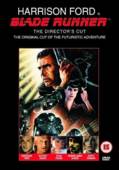Part 1: Man and Machine, Kendred Spirits
A
personal recollection of before, during and after the
experience that was – and still is –
![]()
by Camus
| "Going over to his sheep, Rick bent down searching in the thick white wool... he snapped open the panel covering, revealing it. 'See,' he said to Barbour. 'You understand now why I want your colt so badly? 'After an interval, Barbour said , 'You poor guy. Has it always been this way?'" | |
| Rick Deckard has animal envy in Philip Kendred Dick's source novel Do Androids Dream of Electric Sheep? |
In mid-1982, I was on a triple buzz high. One was happening and two were about to. I was working on an American feature in a small capacity but got out of bed every day, utterly electrified that I was working for director Philip Kaufman on The Right Stuff. With one rare exception, it was the most exciting professional experience I've ever had and all I was doing was recruiting extras and megaphone in hand, (it's true, they liked the accent) moving said extras around San Francisco's enormous Cow Palace. Also on the picture was a publicity and marketing guy who'd got hold of advance material on two films opening that summer, one of which he was working on.
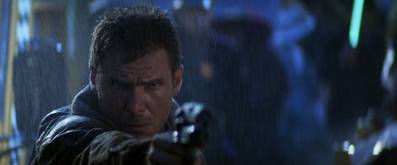
The first was a Christ allegory about a squat, long necked alien and his relationship with a small boy in the suburbs of California directed by then favoured director, Steven Spielberg. The second, the third feature of a British director, Ridley Scott, was coming a few years after Alien, a stone cold horror movie which really disturbed me and whose startling and terrifying images were still ricocheting inside my skull. Not only was Scott back in science fiction, it was an adaptation of a favourite science fiction classic novel, the afore mentioned Philip K. Dick's Do Androids Dream of Electric Sheep and heavens to Betsy, Harrison bloody Ford was Rick Deckard! Life really didn't get any better. True, the Mac was still two years away from its Ridley Scott directed, jaw dropping Superbowl commercial but I didn't know the first thing about computers then. One thing niggled. Could Harrison Ford convince Joe Public that he would kill to own a real goat? It was a question I knew in my heart I'd never have to answer.
"I bought a black Nubian goat," he said.
The book and film dovetail each other in a quite extraordinary way. Like opposing hands clasped together, the left hand – the book – contains religious, spiritual and existential dilemmas and looks deeply into a possible future and features minimal action. If it had one hundred points of dramatic narrative, Ridley Scott would take only points four, nineteen and thirty seven and from two lines in the book, he would fashion a ten minute sequence that would take your breath away. Batty's death in the book (or should I say 'Baty') is exactly four words long; "He shot Roy Baty." In the movie, what a climax... what action, what design, what a speech! "That's the spirit!" Something else the book didn't have which elevated the movie to dizzying heights; the idiosyncratic composer, Vangelis at the height of his powers. Blade Runner, a tremendous re-title after Dangerous Days was suggested, would contain the contemplative philosophy and future environment of the book but buried and sculpted in the production design. There had been a war that had wiped out almost all the animals. Real ones were now priceless and fake ones de rigueur. Did Scott think he had to tell us this? Yes, we had an introductory crawl but that introduced us only to the Nexus 6, the new breed of robot (andy for android in the book and in the movie – upon pain of a tongue lashing from Mr. Scott – a replicant on the troubled set). Everything else about this rain soaked neon world, we had to glean for ourselves and I loved that aspect. Audiences working for their entertainment. When was the last time you saw that in a mainstream picture?
Even forearmed having read the book, you can make no assumptions. You got what you got. It was as near expressionist communication you could get from Hollywood. Overall, Blade Runner was a manhunt, something the book used as a narrative device of getting to grips with the nature of existence, something Hollywood traditionally doesn't make a bean out of. The religious empathy aspects of the book were central to its thesis (the way you proved you were above the 'andys' was shown to be a fake in the book, like someone exposing Scientology with proof of its mumbo-jumbo credentials. Not too difficult you'd think with Hubbard quoted saying: "Writing for a penny a word is ridiculous." He added at a writers' meeting that "if a man really wanted to make a million dollars, the best way to do it would be start his own religion." I wonder how such silly things get believed by so many. In the book it's the empathic Mercerism that is denounced, an experience of pain that you feel as you climb a steep slope and get rocks hurled at you. You've got to love belief systems.
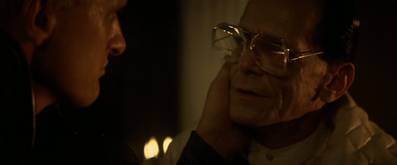
None of that intellectual lardy-dah for Blade Runner. We had flying cars and vast cityscapes, guns and Harrison Ford having four flavours of crap beaten out of him. And, oh. The special effects. They were the real deal (computers just controlled the cameras' movement but that was it) and we were smitten. But most of all, something a lot of us realised in the early days, we had a bona fide classic on our hands despite the utter ludicrousness of its ending... As I wrote on the day I first saw the film; "It starts and is truly mesmerising. Superb stuff. Am Rick Deckard all day." I'm going to assume that Slarek will cover the hypocrisy of the media in backtracking their opinions of the film. It was 2001 A Space Odyssey all over again. Yes, it had flaws (what movie doesn't). It showed signs of being hastily re-cut after disastrous previews (close ups from scene 150 inexplicably appearing in Scene 21 with thumbs visible where there could not be thumbs; a voiceover that seemed to explain things which went against the visuals; some great stunt work only marred by the fact it was ever so obviously not the actress in question; and for me the scene that will always grate – as I'm sure it does with most who adore this film – the interrogation of Hassan. Whatever made Scott accept this hilarious bit of out of sync, out of scene mouth work (it's all too clear the sound from one scene has been placed clumsily over another) is a mystery I was hoping would eventually be cleared up. When I heard about a proposed 'Director's Cut' many years down the line, I was thrilled. New scenes! No silly ending and all the problems addressed... Oh, were it so. Still, like a mole on a lover's back, I'd miss the mistakes if they really were eradicated. That first screening still resonates. I clearly remember the effort made to see a movie early fuelled by an anticipation that a mere movie could not possibly live up to. Boy, was I wrong on that one.
"Wake up. Time to die."
I get up at about 4am for very few people and even fewer reasons. One of the latter was Philip K. Dick interpreted by Ridley Scott starring Harrison Ford and a free cinema ticket. OK, I had to find fellow believers and drive the three and a half hours to get to the London West End cinema – parking space in the Smoke? Sheesh. But we made it and it was almost fitting that fellow Outsider scribe Slarek was standing in the queue – both of us with no idea the other would be there. If our version of events differ, believe him. This experience was like a drug to me and you know how they affect total recall (that was my one and only Dick joke). This was to be an audience of believers, a hand picked (by a voucher featured in Starburst magazine) crowd who were there to love this film. There is a flip-side. If they'd not loved it (they? We...) it would have been trounced very vocally. If the cinema is my church then the cheers that greeted the mere curtain opening were the prelude to the Hallelujah chorus two hours later.
The tree of the Ladd company logo, shimmers forming itself from the top to the bottom (don't worry, I'm not going to dissect the movie frame by frame). I'm making the rash assumption that we've all seen it (if on TV then you have certainly not seen it). My own company has a tree logo and it has only just struck me that Blade Runner's very first visual might have buried itself deeply just biding its time. The full stop at the end of the opening scroll was a full frame title: Los Angeles November 2019. Vangelis has been sparse and tinkering in the background. The glorious Greek then pulls out several thousand stops as Los Angeles, 2019 shows itself, Hades for the post-industrial age. This, ladies and gentlemen, is the very definition of cinema – a moment of stunned disbelief, a moment truly breathtaking. There was awe in that room that day. After the Hallelujah chorus (started as the end credits played out) we were a room full of believers despite that utterly incomprehensible ending (this was the first time I realised what power a studio actually wielded). To hell with the flaws. At that moment the only flaw I was concerned about was the one from which I had to pick up my jaw.
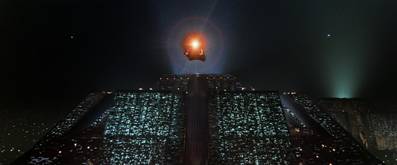
I was 21, impressionable perhaps, but certain I'd just seen a masterpiece. Following on, in the pages of Starburst a month later, came the review by the late lamented John Brosnan that began "Blade Runner is a masterpiece, much to my surprise..." Still, the masterpiece would go through several iterations before (I sincerely hope) the last word and tinkering by Mr. Scott renders it 'finished'. So how do you sustain a movie's enthusiasm peak? You buy the odds and sods but most importantly (as announced in the end credits) you move Heaven and Earth to buy the soundtrack.
"I dreamt music..."
The
"Du-du-du-du, du-du-du-du..." end title was
still settling itself comfortably into my memory but what
was punching through most of all was (back then I was
aghast) that extraordinary love theme. You couldn't rock
to a love theme but it had an odd effect on me. It brought
the profound human desolation of the movie home. I am
still convinced that sax was a real sax despite reading
somewhere it was all Vangelis' synthesizers. Oh, wait.
There's something called an internet out there –
Dick Morrisey, saxophonist! There you go. I couldn't wait
to get my hands on the soundtrack. But this was 1982.
The internet wasn't even a gleam in Gore's eye. Bootleg
was a word I'd heard but had no idea how you infiltrate
the lower strata of those dealing in such things as Bootlegs.I
was a good boy but fuck, I wanted that soundtrack. Rights
issues, arguments, creative differences, force majeure,
whatever but the original was not going to be issued.
I felt like someone had punched me. But, but...
And then out came the album Vangelis' Blade Runner!
Performed by the New American Orchestra? Get the holy
crap out of there. Unspeakable. Depraved profiteering.
But I bought it (which true BR fan could resist it?) But
it wasn't even a shadow, a threadbare veil of the original.
Remember Pickwick, the record label? They'd come out with,
let's face it, pretty dire covers of original pop songs,
shove 10 on an album and they sold like crazy. My parents
came home one day with a special present, the soundtrack
to a favourite movie, Chitty Chitty Bang Bang.
I noted the cover art was cheesier than Kip Kano's odour
eaters and plonked it on the turntable ready to relive
the magic. After two bars I burst into tears (I was seven)
and scrutinized the cover – it was the most godawful
re-recording, a Pickwick classic and it scarred me. My
mother was shocked at my reaction. I brandished the cover
and through my over the top upset, wailed that even the
guy on the cover looked nothing like Dick van Dyke! My
mother wasn't bothered about the differences between the
original and the travesty. I was seething. It not only
belittled the original, it was a lie. I wrote down the
words "Original Motion Picture Soundtrack" in
big letters for my mother for next time. A cover version
would never soil my turntable again. Well, not until 'Wild
Horses' by The Sundays anyway.
But this was worse because there was no original Blade Runner album out there. I mean, I had to wait another seven years before selected cues were released on Vangelis' 'Themes' album. Where was the true original motion picture soundtrack? When it did happen, a good 12 years after the movie was released, a lot of the beloved music was there with a few new pieces but (a huge but) Vangelis, in his wisdom, had peppered the score with dialogue. Ah, holy hell. If we wanted the damn dialogue, we'd have ripped the score from a Hi-Fi VHS of the movie for Christ's sake – which of course I did. I cannot tell you how disappointing that was. I wanted just the music. Well, the internet has provided me with the ultimate music-only album except that the quality is pretty ropey. So there is still a Blade Runner album out there somewhere to be released... So please someone release it.
"Buster Friendly said "We may never know. Nor can we fathom the particular purpose behind this swindle."
And then a rumour... Someone had got hold of a viewing print of the original cutting copy (the print the editor physically cuts and once locked the negative is cut in tandem and prints made from it) and screened it to packed houses in L.A. 'The Director's Cut' of Blade Runner! Good God! Great merciful God! It turns out that this was nothing of the sort (it was a work in progress) but it did contain missing scenes (of course it did, it was a cutting copy), notably Deckard visiting Holden in hospital and most notably, the Vangelis score was only partially laid. Curiously parts of the ending had been temp tracked by Jerry Goldsmith's superb Planet of the Apes score – now there's a head-fuck. Cries went out for an official release after the success of this work-print. To cash in on its buzz, Warners and Scott (way too busy on Thelma and Louise to do the job his classic deserved) gave one of Scott's associates a short list – changes to be made. They were simply: Lose the narration, add the unicorn, lose the ending. I know this because I spoke to the guy that made the so called 'Director's Cut'.
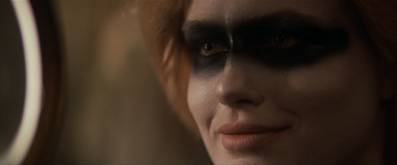
The changes were made and closing the London Film Festival in 1992, the re-jigged but not definitive Blade Runner made its UK debut. I was there and it was not a particularly memorable experience partly because all the cock-ups were still there (I had expected them to be fixed) and the changes so minimal it never felt worth all the fuss. It wasn't 'that' film, 'my' film anymore. It also contained the damned unicorn effectively rending in two one of the quieter, most melancholy moments of the film – Deckard at the piano. It was not the right place to cut that damn animal in – he is not dreaming at the piano. He is dreaming on the couch. I got angry at that. And that drone on the soundtrack over the unicorn? Vangelis, Schmangelis. It was a hatchet job. The changes were so mis-handled, it was like trying to write italics with a pile driver. I hope next year, Mr. Scott has regained a nib.
What worried me was that there wouldn't be an original version of the film I reacted so strongly to at that screening in 1982 available at all. I am told next year's definitive release will have it. So what do we have available now? A hastily altered Blade Runner and by no means definitive. But this is the version released today (as I write), seemingly a blatant copy of the Region 1 DVD. Just the movie.
Don't get me wrong. It's just screwing around with movies after their original release is something seemingly never done well. I won't lay in to George Lucas although someone should. A film is a communication made by a film-maker at that time in his or her life. What if you loved Jaws and Spielberg went back and made Bruce much more realistic? Eeyuck. More worryingly is that artists change and cherished beliefs about 'x' may now be replaced by 'y' and you're going to re-cut your movie with 'y' in mind. It's not right. It feels wrong even given Blade Runner's obvious studio-led screw ups. If movies were like people, sometimes you love them, faults included. Sometimes the faults are part of the magic. I can think of only one film, one acknowledged classic, with an ending so dire, an ending so uniquely going against the grain of the film itself, it defies rational analysis. If Hitchcock, the master, can end Psycho with a psychoanalyst explaining away Norman's behaviour, Blade Runner can end on Stanley Kubrick's out-takes. That was the movie I reacted to and that's the movie I want on my screen...

